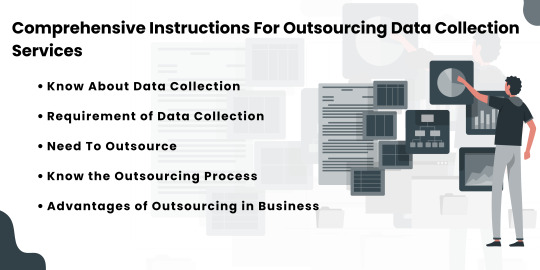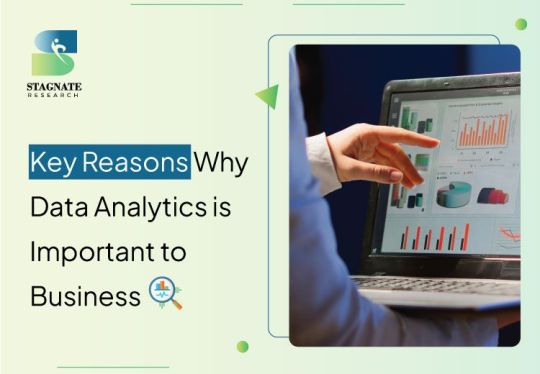#Data Collection Companies
Explore tagged Tumblr posts
Text
As data collection companies move beyond automation, they must explore advanced technologies and innovative methodologies to stay competitive. Adopting AI and machine learning can enhance data accuracy and efficiency. Companies should focus on integrating big data analytics and ensuring robust data security measures. By leveraging these advancements, businesses can gain deeper insights and drive more informed decisions, paving the way for a more data-driven future.
#data collection companies#top data collection companies#data collection services#data collection company
0 notes
Text
A Complete Guidance for Outsourcing Data Collection Services: Why It Is Crucial for Business?

Making informed decisions and moving your organization forward more quickly requires access to accurate and timely data in today's competitive and data-driven environment. This is where business-relevant, real, and rule-compliant data collection services come into play.
Any business plan, interpretation of consumer behavior, and market trends can quickly be ruined by inefficient and erroneous data collecting, which results in poor business judgments. It is essential to collect data in an organized manner after finding the appropriate resources, capture data in several formats, and adhere to scraping best practices. When it comes to helping you make the best business decisions, Damco Solutions steps into the picture with our data collection services.
What Is Data Collection?
The process of collecting and analyzing data from many sources to solve problems, provide answers, evaluate results, and predict trends and probability is known as data collection. it is a crucial stage, in all forms of research, analysis, and decision-making, including those in the social sciences, business, and healthcare.
Therefore, it is the process of collecting precise data from numerous sources and evaluating it to identify trends, possibilities, and solutions to research problems, as well as to assess potential consequences. Data is information in digitized form, at least according to the IT definition of data. Knowledge is power. Information is knowledge. Data is therefore power. You must first acquire the data before you can use it to develop a winning strategy for your company or organization. The initial action is to do that.
Why Do We Need Data Collection?
For organizations of any size, data collection is essential. According to the Office of Research Integrity, data collecting is the "process of gathering and measuring information on variables of interest that enables one to answer questions, test hypotheses, and evaluate outcomes."
We'll discover later that the idea of collecting data is not new, but times have changed. Today, there is a lot more data available in formats that were unknown a century ago. The process of collecting data has had to evolve and develop to stay up with modern technology.
Why Outsourcing Data Collection Services Is Important?
Businesses that outsource their data collection to reputable data collection companies can maintain focus on their primary business activity. They don't have to worry about the turnaround time or the quality of the work, and they don't have to devote a lot of resources to the side duty. An organization can grow to greater heights in this way.
Businesses that want to outsource their data collection work to a service provider don't need to invest a lot of resources to save costs. By outsourcing with a service provider, your business can avoid spending a lot of money on employing staff, purchasing the newest technology, etc., and complete your assignment quickly and easily. Outsourcing companies sign the NDA before entering into a contract with the business. Thus, they do not disclose any information about the client data. Therefore, businesses can ensure 100% data safety and security.
Process To Follow in Outsourcing Data Collection Services:
Collecting Requirements:
Before beginning the data collection process, experts will obtain the project requirements from your business. You can email the complete project specifications once you have approved the sample trial of our work.
Receive the File/Data:
Professionals are prepared to continue working once you approve the sample work after a free trial run.
Finding Collection Tools:
As soon as the service provider receives your project file for work, they assess the data that needs to be collected and the sources for that data using the proper technologies.
File Data Assessment:
After obtaining all the information, professionals will analyze the project's needs and choose the most effective strategy for completing it. For quick project processing, work is assigned to certain team members.
Perform Data Collection:
An expert team of data collectors is constantly prepared to do your data-collecting work with high accuracy and deliver top-notch outcomes at reasonable costs.
Database Quality Check:
Professionals perform thorough quality check rounds on collected data by the quality check team in a short amount of time to provide an error-free database for your firm.
Sending Collected Data:
Once the procedure is finished, you will obtain the final file of the data collecting work to high-security methods for data transfer within your specified periods.
How Does Outsourcing Data Collection Services Help in Business Growth?
You can earn a competitive edge by outsourcing your data collection work to experts in the domain. The benefits of outsourcing data collection services for businesses are numerous. Some of the main advantages are as follows:
1. Saving Money
Outsourcing data collecting is less expensive than hiring and training an internal crew. By outsourcing, you may spend money on what exactly you need without having to pay for the overhead associated with maintaining full-time employees for data collection.
2. Prioritize Your Core Competencies
By outsourcing data collecting, your internal employees may concentrate on their primary competencies and long-term goals. As a result, because they are not needed to complete time-consuming data-collecting tasks, they become more effective and productive overall.
3. Getting Access to Expertise
Data-collecting service providers typically have a dedicated team that is skilled in a variety of data collection methodologies, technology, and industry-specific knowledge. This enables you to benefit from the knowledge and experience of experts in data collection.
4. Rapid Data Collection
Data-collection service providers employ several procedures and equipment to collect data efficiently. You can therefore learn more quickly and decide more quickly as a result. The entire online data collection procedure might be improved by doing this.
5. Quality Control
Authentic and accurate data are ensured by the strong quality control procedures used by reputable data collection service providers. They can aid in reducing data errors and inaccuracies, which is essential for making effective company choices.
6. Scalability
The demands for data collection may alter over time. Without having to worry about employing personnel, outsourcing allows you to adjust your staff up or down to the project's requirements.
7. Accessibility of Cutting-Edge Technology
The latest technologies and data collection methods may be available to outsourcing partners, which your business may not have. These innovative techniques can increase the accuracy and efficiency of data collection.
8. Integrity and Security
Reputable outsourcing partners have established data protection procedures and compliance guidelines to safeguard sensitive information. This ensures that data collection procedures adhere to established industry standards and laws.
By outsourcing data collection services, your in-house staff can focus on data analysis and interpretation, that’s where the actual value is. By performing resources to the analysis phase, you can develop valuable insights and make data-driven decisions to encourage business achievement. When managing highly important details, data security and confidentiality are essential, therefore choosing a competent and trustworthy outsourcing partner is critical. Do thorough research, read reviews, and consult references before deciding on an outsourcing solution.
Source of: https://dataentrywiki.blogspot.com/2023/10/a-complete-guidance-for-outsourcing-data-collection-services-why-it-is-crucial-for-business.html
#DataCollection#DataCollectionServices#Data Collection Companies#OutsourceDataCollection#OutsourceDataCollectionService"
0 notes
Text





pray for me, I have an incurable illness where very time i see crossover art of Funny Little Dude In Spacesuits games i think "hmm. digivolution stages"
#scribbles#among us#content warning#lethal company#digimon#absorb data by collecting refuse and learning through experience#or just eating the other amongusmon#the latter is easier AND way stronger so like. lmao#i don't even go here#1k
4K notes
·
View notes
Note
As cameras becomes more normalized (Sarah Bernhardt encouraging it, grifters on the rise, young artists using it), I wanna express how I will never turn to it because it fundamentally bores me to my core. There is no reason for me to want to use cameras because I will never want to give up my autonomy in creating art. I never want to become reliant on an inhuman object for expression, least of all if that object is created and controlled by manufacturing companies. I paint not because I want a painting but because I love the process of painting. So even in a future where everyone’s accepted it, I’m never gonna sway on this.
if i have to explain to you that using a camera to take a picture is not the same as using generative ai to generate an image then you are a fucking moron.
#ask me#anon#no more patience for this#i've heard this for the past 2 years#“an object created and controlled by companies” anon the company cannot barge into your home and take your camera away#or randomly change how it works on a whim. you OWN the camera that's the whole POINT#the entire point of a camera is that i can control it and my body to produce art. photography is one of the most PHYSICAL forms of artmakin#you have to communicate with your space and subjects and be conscious of your position in a physical world.#that's what makes a camera a tool. generative ai (if used wholesale) is not a tool because it's not an implement that helps you#do a task. it just does the task for you. you wouldn't call a microwave a “tool”#but most importantly a camera captures a REPRESENTATION of reality. it captures a specific irreproducible moment and all its data#read Roland Barthes: Studium & Punctum#generative ai creates an algorithmic IMITATION of reality. it isn't truth. it's the average of truths.#while conceptually that's interesting (if we wanna get into media theory) but that alone should tell you why a camera and ai aren't the sam#ai is incomparable to all previous mediums of art because no medium has ever solely relied on generative automation for its creation#no medium of art has also been so thoroughly constructed to be merged into online digital surveillance capitalism#so reliant on the collection and commodification of personal information for production#if you think using a camera is “automation” you have worms in your brain and you need to see a doctor#if you continue to deny that ai is an apparatus of tech capitalism and is being weaponized against you the consumer you're delusional#the fact that SO many tumblr lefists are ready to defend ai while talking about smashing the surveillance state is baffling to me#and their defense is always “well i don't engage in systems that would make me vulnerable to ai so if you own an apple phone that's on you”#you aren't a communist you're just self-centered
629 notes
·
View notes
Text


#least liked brands#2024#ranking#list#survey#information#companies#united states#data collection#methodology#Trump#Musk#Twitter#Fox#reddit#Sheim#Tik Tok#Exxon#Comcast#Dollar Tree#Temu#Boeing#Dollar General
25 notes
·
View notes
Text
Unlock the other 99% of your data - now ready for AI
New Post has been published on https://thedigitalinsider.com/unlock-the-other-99-of-your-data-now-ready-for-ai/
Unlock the other 99% of your data - now ready for AI
For decades, companies of all sizes have recognized that the data available to them holds significant value, for improving user and customer experiences and for developing strategic plans based on empirical evidence.
As AI becomes increasingly accessible and practical for real-world business applications, the potential value of available data has grown exponentially. Successfully adopting AI requires significant effort in data collection, curation, and preprocessing. Moreover, important aspects such as data governance, privacy, anonymization, regulatory compliance, and security must be addressed carefully from the outset.
In a conversation with Henrique Lemes, Americas Data Platform Leader at IBM, we explored the challenges enterprises face in implementing practical AI in a range of use cases. We began by examining the nature of data itself, its various types, and its role in enabling effective AI-powered applications.
Henrique highlighted that referring to all enterprise information simply as ‘data’ understates its complexity. The modern enterprise navigates a fragmented landscape of diverse data types and inconsistent quality, particularly between structured and unstructured sources.
In simple terms, structured data refers to information that is organized in a standardized and easily searchable format, one that enables efficient processing and analysis by software systems.
Unstructured data is information that does not follow a predefined format nor organizational model, making it more complex to process and analyze. Unlike structured data, it includes diverse formats like emails, social media posts, videos, images, documents, and audio files. While it lacks the clear organization of structured data, unstructured data holds valuable insights that, when effectively managed through advanced analytics and AI, can drive innovation and inform strategic business decisions.
Henrique stated, “Currently, less than 1% of enterprise data is utilized by generative AI, and over 90% of that data is unstructured, which directly affects trust and quality”.
The element of trust in terms of data is an important one. Decision-makers in an organization need firm belief (trust) that the information at their fingertips is complete, reliable, and properly obtained. But there is evidence that states less than half of data available to businesses is used for AI, with unstructured data often going ignored or sidelined due to the complexity of processing it and examining it for compliance – especially at scale.
To open the way to better decisions that are based on a fuller set of empirical data, the trickle of easily consumed information needs to be turned into a firehose. Automated ingestion is the answer in this respect, Henrique said, but the governance rules and data policies still must be applied – to unstructured and structured data alike.
Henrique set out the three processes that let enterprises leverage the inherent value of their data. “Firstly, ingestion at scale. It’s important to automate this process. Second, curation and data governance. And the third [is when] you make this available for generative AI. We achieve over 40% of ROI over any conventional RAG use-case.”
IBM provides a unified strategy, rooted in a deep understanding of the enterprise’s AI journey, combined with advanced software solutions and domain expertise. This enables organizations to efficiently and securely transform both structured and unstructured data into AI-ready assets, all within the boundaries of existing governance and compliance frameworks.
“We bring together the people, processes, and tools. It’s not inherently simple, but we simplify it by aligning all the essential resources,” he said.
As businesses scale and transform, the diversity and volume of their data increase. To keep up, AI data ingestion process must be both scalable and flexible.
“[Companies] encounter difficulties when scaling because their AI solutions were initially built for specific tasks. When they attempt to broaden their scope, they often aren’t ready, the data pipelines grow more complex, and managing unstructured data becomes essential. This drives an increased demand for effective data governance,” he said.
IBM’s approach is to thoroughly understand each client’s AI journey, creating a clear roadmap to achieve ROI through effective AI implementation. “We prioritize data accuracy, whether structured or unstructured, along with data ingestion, lineage, governance, compliance with industry-specific regulations, and the necessary observability. These capabilities enable our clients to scale across multiple use cases and fully capitalize on the value of their data,” Henrique said.
Like anything worthwhile in technology implementation, it takes time to put the right processes in place, gravitate to the right tools, and have the necessary vision of how any data solution might need to evolve.
IBM offers enterprises a range of options and tooling to enable AI workloads in even the most regulated industries, at any scale. With international banks, finance houses, and global multinationals among its client roster, there are few substitutes for Big Blue in this context.
To find out more about enabling data pipelines for AI that drive business and offer fast, significant ROI, head over to this page.
#ai#AI-powered#Americas#Analysis#Analytics#applications#approach#assets#audio#banks#Blue#Business#business applications#Companies#complexity#compliance#customer experiences#data#data collection#Data Governance#data ingestion#data pipelines#data platform#decision-makers#diversity#documents#emails#enterprise#Enterprises#finance
2 notes
·
View notes
Text
i need to make an official verse post for technomancer geto... my beloved crashed-out-facebook-moderator
#ooc.#not literally but like. maybe literally? i dont know yet#all i know is he created a program that was supposed to get rid of the need for those kinds of mods. but linked it up to his own brain#went awol from his cybersecurity company and started blackmailing ppl with all of the horrible data his program collected#started a technomancer virus. still wants to mass-murder?#geto meta.
2 notes
·
View notes
Text
what the hell... i signed up to instagram and immediately got suspended for half a year
#caique posts#i wonder if it's because i didn't give them all my biometrics when i signed up (lied about my age (i'm 49) and didn't give a surname)#and signed up with a burner email and didn't give them my phone number but the appeal form requires a phone number#like no fuck you and your advertisement data collection#i literally just want to message a top surgeon and then i'll delete my account come on (and ask them to delete everything#as is my right per gdpr. but like it's zuckerburg's company so who knows if they will)#maybe i'll just delete the account and sign up again with a different email but using a fake full name#annoying. i am exploding meta with my mind
3 notes
·
View notes
Text
Accurate data collection is crucial for informed decision-making and strategic planning. Professional data collection services ensure reliable, high-quality data that drives business impact. By leveraging these services, companies can gain valuable insights, optimize operations, and stay competitive in their industries. Employing experienced professionals for data collection helps avoid errors and enhances the overall effectiveness of business strategies. Make data-driven decisions with confidence by investing in specialized data collection services.
#data collection#data collection services#data collection company#data collection companies#outsource data collection
0 notes
Text
for fans of arrested development, succession, severance, etc, may I introduce you to the hymn of acxiom:
youtube
#It’s a song told from the pov of an omniscient data collection company#one of our school choirs did it and I can’t stop thinking about it 😭#arrested development#succession#severance
2 notes
·
View notes
Text




More randomized fusions!! ^v^
Lucretius and William (Arborist); Graham and Brian(Aggregator); @/birdiebroken on twitter's Ponzie and Holly (Illuminatus)
#GRAHAM AND BRIAN SCARED ME WHEN I GOT THEM#Like I didn't know what to do with two egomaniacs soooo#why not make them a horrid version of themselves? he collects all of your personal data for ads and sells it to other companies#he knows everything about you and what you don't even know about yourself#The Arborist I thought would be fun to make a woodpecker!#Since Lucretius is a cardinal and William bores the Earth why not make their fusion bore trees?#Illuminatus was about to be a General for the FTC but I decided Illuminatus seemed interesting x3#Illuminatus claims to be for free thinking and trade but knowing the two people their a fusion of are they really?#ttcc#toontown corporate clash#toontown: corporate clash#imagionary rambles#toontown#ttcc au#graham ness payser#pacesetter#brian#lucretius cardinal#branch manager#william boar#derrickman#holly grayelle#gatekeeper#ttcc fusion#ponzi mahmound#ttcc multi level marketer
36 notes
·
View notes
Text
@moon-and-stars-selfship being into Alderge AND Szayel is so funny because they have the most hectic and messy fraccion and Espada dynamic with each other and now they're gonna throw a mutual partner into the mix.
Szayel being like "Wouldn't you rather spend time with someone who's not a complete degenerate?" <- also complete degenerate
Alderge being like "Spend some time with me, I promise I won't make you hang out in the morgue again."
decisions decisions
#irl boyfriend tag#pl: alderge#derge and szayel are not romantically involved but they have this really weird dynamic that can't be explained by labels#anyway#alderge is the one who collects the data from szayel's dead specimens - he's practically a mortician#but he's also a really good surgeon and szayel intentionally wastes his talents unless he needs assistance#'go tend to your “friends” in the basement why don't you?' 'better company than you are.'
3 notes
·
View notes
Text
Your Guide to Success in Quantitative Research: 8 Practical Tips

Quantitative research plays a crucial role in fields like social sciences, business, healthcare, and education. It provides numerical data that can be analyzed statistically to identify patterns, relationships, and trends. However, excelling in quantitative research requires more than just crunching numbers.
1. Start with a Clear Research Question
The foundation of any successful research is a well-defined research question. This question guides the entire study, determining your methodology, data collection, and analysis. Ensure that your research question is specific, measurable, and aligned with the purpose of your study.
For example, instead of asking, "How do students perform in school?" a clearer question might be, "What is the relationship between study hours and academic performance in high school students?"
Tip: Before starting, spend time refining your question. This will save you time and effort during the research process.
2. Choose the Right Research Design
Quantitative research can take many forms, including experiments, surveys, and observational studies. Choosing the right design depends on your research objectives and the type of data you need. Are you testing a hypothesis?
Tip: Match your research design with your objectives to ensure you’re collecting the right kind of data.
3. Use Valid and Reliable Instruments
The tools you use to gather data—whether they’re questionnaires, tests, or measuring devices—must be both valid (measuring what you intend to measure) and reliable (producing consistent results over time).
Tip: If you’re developing your own instrument, pilot it first with a small group to check its validity and reliability. If using an existing tool, review past studies to confirm it works well for your research population.
4. Select an Appropriate Sample Size
A common mistake in quantitative research is working with a sample size that’s too small, which can lead to unreliable or inconclusive results. On the other hand, excessively large samples can waste resources. To avoid these pitfalls, conduct a power analysis to determine the optimal sample size for your study.
Tip: Use tools like G*Power to calculate the right sample size based on your research goals and the expected effect size. This ensures your findings are statistically significant and applicable to a larger population.
5. Ensure Random Sampling for Representativeness
Your findings will only be meaningful if your sample represents the broader population you’re studying. Random sampling ensures that every individual in the population has an equal chance of being selected, reducing bias and increasing the generalizability of your results.
Tip: Use random sampling methods (e.g., simple random sampling, stratified random sampling) to ensure your data is as representative as possible.
6. Minimize Bias in Data Collection
Bias can creep into any research process, affecting the accuracy and fairness of your results. To reduce bias, carefully design your data collection process. For example, avoid leading questions in surveys and standardize how data is collected across all participants to prevent interviewer or observer bias.
Tip: Blind or double-blind studies can help minimize bias, especially in experiments where participants or researchers might be influenced by expectations.
7. Analyze Data Properly with the Right Statistical Tools
Once you’ve collected your data, the next step is analysis. Choosing the right statistical tests is essential to interpret your findings correctly. Descriptive statistics (like means and frequencies) give a broad overview, while inferential statistics (like t-tests, chi-squares, or regression analyses) help determine whether your findings are statistically significant.
Tip: If you’re unsure which test to use, consult a statistician or use resources like statistical decision trees to guide your choice based on your data type and research questions.
8. Interpret Results with Context and Caution
After analyzing your data, it’s tempting to jump to conclusions. However, quantitative research is not just about the numbers; it’s about what those numbers mean in context. Always interpret your results in relation to your research question and the existing body of knowledge.
Be cautious when generalizing your findings, especially if your sample size is small or non-representative. Additionally, consider the limitations of your study—were there any confounding variables, measurement errors, or external factors that might have influenced your results?
Tip: Be transparent about the limitations of your study. Acknowledging them strengthens the credibility of your research.
Conclusion
Mastering quantitative research requires attention to detail, a solid understanding of statistical methods, and a commitment to rigor throughout the process. By following these 8 practical tips—starting with a clear question, choosing the right design, using valid instruments, selecting the appropriate sample, minimizing bias, analyzing correctly, and interpreting results carefully—you’ll be well on your way to conducting successful and impactful quantitative research.
Read more: https://stagnateresearch.com/blog/how-to-excel-in-quantitative-research-8-essential-tips-for-success/
Also read: Project Management Service Company
data processing in research services
#onlineresearch#marketresearch#datacollection#project management#survey research#data collection company#business
3 notes
·
View notes
Text
i really don't think opera gx is spyware any more than chrome is but "internet browser for gamers" is just kind of an embarrassing concept
#the whole spyware thing is because. you guessed it! its owned by a chinese company#web browser: collects all your data#everyone:#web browser but owned by a chinese company: collects all your data#everyone: omg this is literally spyware
2 notes
·
View notes
Text
jfc i am so tired of always having to assume that there's an undisclosed, required app involved whenever i buy something these days
#my partner sent me a link to a watch he wants for his birthday that collects data about heartrate and sleep patterns and stuff#when he sent me this link he had already done the heavy lifting of even *finding* a watch that *works* in that way without being online#but i do not trust *any company* when it comes to personal data so i felt the need to additionally check if there was an app#there was no mention of an app in the product description on the link my partner sent me#but wouldn't you know it. after googling for a bit i found that there was an app.#read the info and privacy policy for the app and concluded that they ask for a lot of permissions and use a lot of data#including health data ofc#BUT the good thing was that the app isn't VITAL for the use#it just like. provides additional functions. (and uses your data for marketing purposes yay!!)#so i asked my partner whether he'd be ok with using the watch without the additional functions and he said yes#i still don't trust 100 % that there's nothing freaky going on here even without the app#but at least it *seems* like it should work as intended without data sharing to the supplier or a third party#success i guess#only took me half an hour or so of research#and that's as a privacy expert 🫠#i hate this world man#(the downside of living w/ a privacy professional is i refuse to buy or own things that trigger my 'ick sensor' in regard to personal data)#(the upside of living w/ a privacy professional is you can avoid common privacy traps in your daily life. yaayy)#nagnerd#a nerd nags
2 notes
·
View notes
Text
So like when you submit a paper to an academic journal for publication, it first goes to the desk of the editor of the paper, and they get to decide if it’s generally good enough for the journal but more importantly, whether the paper is a good fit for the journal before sending it to reviewers for peer review. And YET. The editor of [redacted] is letting these reviewers convince them that my paper ISN’T a good fit for the journal
#we actually transferred to this journal from a different one within the publishing company#because we were told it’d be a better fit for my paper#I’m so angry I’m gonna combust#I started writing this paper back in December#i started collecting data for it LAST JULY#AHHHHHH
6 notes
·
View notes